DESPITE being a signatory to the 1989 tripartite Haadyai Peace Agreement, no official representative from Malaysia attended the 20th anniversary commemorative ceremony held on 30 Nov 2009 in Haadyai, Thailand.
The two other signatories to the accords, the Thai government and the Communist Party of Malaya (CPM), were respectively represented by Thai Deputy Interior Minister Thavorn Senneam and former CPM secretary-general Chin Peng.
Malaysia’s absence would reflect badly on its “trustworthiness” as a signatory to the agreement, political analyst James Wong from Strategic Analysis Malaysia said in an immediate reaction. Wong was present as a guest at the ceremony.
“We are a civil society that should know how to honour contracts and agreements. The peace accords were signed in public and documented.
“We should give credit to Malaysia where it’s due, in that it has honoured most of the agreement except for Chin Peng’s return. But by not attending the ceremony, it is as if Malaysia does not take the treaty they signed seriously,” Wong told Malaysian reporters.
The top three government officials invited from Malaysia were Prime Minister Datuk Seri Najib Razak, Home Minister Datuk Seri Hishammuddin Hussein, and Inspector-General of Police (IGP) Tan Sri Musa Hassan, ceremony organisers said.
Wong said Malaysia could have at the very least sent the ministry’s secretary-general or the deputy IGP.
Invitations to the Malaysian side were issued by the Thai government, said Indra Jaya Abdullah, chairperson of the ceremony organising committee. The event was organised by associates of Chin Peng, including the 21st Century Malaysia Friendship Association, a group founded by former CPM cadres to look after the welfare of resettled ex-guerrillas in Malaysia.
Indra Jaya said the invitations to Malaysian government officials were sent out by the Thai government by way of two letters, one at a government-to-government level, and the other an invitation from Chin Peng’s associates.
The ceremony was held at the Lee Gardens Hotel, where the peace accords were signed 20 years ago on 2 Dec. It was attended by several hundred people, mainly members of the Friendship Association.
Before the event, the association held an assembly where a resolution calling for Chin Peng’s return to Malaysia was passed.
Prevented from returning
Chin Peng, when delivering his speech at the commemorative ceremony later, made another appeal to be allowed to return to his homeland.
“In 1989, all three parties were able to achieve the peace agreement because all sides were sincere and wanted an end to the conflict. There was a spirit of mutual understanding and mutual forgiveness.
“Now, Malaysia is preventing me from returning. This will tarnish the peace accords. I make this appeal, let us forget the past and let us move forward together.
“I am just another human being nearing the end of my life and who wishes to pay his respects to his ancestors,” Chin Peng said.
Honouring peace
Before reading his speech, Chin Peng observed a personal minute of silence in memory of those who died on all sides of the armed conflict.
Thai minister Senneam, in his speech, placed on record his government’s efforts in helping former CPM members obtain citizenship and settle in “friendship villages“, which are under the care and patronage of the Thai royal family.
“We have given land and nationality as tangible evidence of real peace,” Senneam said.
The only prominent Malaysian present at the ceremony was Datuk Yau Kong Yew, the former Special Branch deputy director who was a member of the Malaysian team in the peace negotiations.
He declined to comment on the Malaysian government’s absence at the ceremony.
“I have retired and am here in my personal capacity. I am happy to be here because I had a role in putting the peace accord in place. The accords were achieved because there was a sense of forgiveness and willingness to move on. This spirit should continue,” he said. ![]()
The Nut Graph needs your support
See also:
“What if Chin Peng was Malay?”
Was Chin Peng played out?

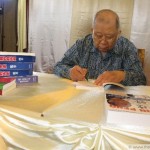
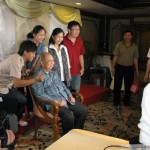
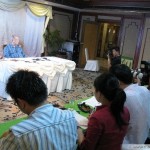
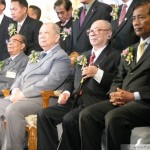
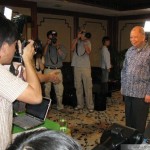
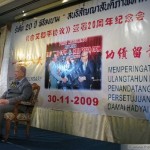
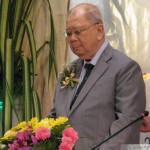
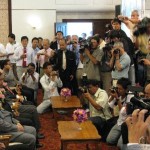
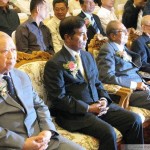
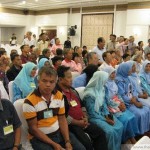
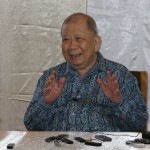
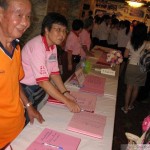

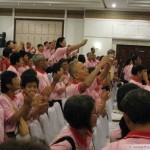
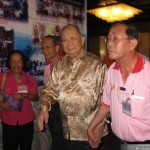


mudah cerita says
Bayangkan Chin Peng meninggalkan (mati) di Thailand.
Bayangkan Tugu Peringatan didirikan untuk mengenangkan jasanya sebagai tokoh sejarah melawan penjajahan Inggeris. Ini juga akan menarik pelancung melawat tugunya di Thailand (luar Malaysia). Ini akan memburukan imej Malaysia, orang yang mati lebih banyak mendatangkan kesan negatif ke atas Malaysia.
Biarkan dia balik dan dia mati kita kebumikan dia dan tinggalkan dia dalam senyap sunyi..(dia tidak ada glamour lagi kerana dalam kawalan kita). Bukankah cara ini baik dari membiarkan beliau menyalak di luar negara. Dalam negara dia akan senyap…sunyi..
Merah Silu says
Well, I do not understand why he should be given a lot of sympathy, and more so by Malaysians. He has [caused] tremendous difficulties and damage to this country. Let him die in Thailand or in his motherland/ancestor’s land China. If his Malaysian sympathisers would like to erect a “Tugu Peringatan” in Thailand or in China, let them do it. They can visit, pay respects, or even pray at his grave. It has no consequence to us. Our court of law decided that he is not a citizen of this country. So, why bother. He was a terrorist, after all.
abc says
That’s Umno for you. They never seem to understand the sanctity of an agreement. Maybe for too long, they have been above the law.
Siew Eng says
I was at the Tugu Kebangsaan by chance recently, after decades of never stepping foot there. This time, I could see it for what it was. Shamsiah Fakeh was right. That monument remembering “our glorious dead”, listing names of mostly Brits and a few Gurkhas with even fewer Muslim names were all colonialists or those who worked for them. It’s so ironic that we changed the names of our roads to minimise this reminder of our inglorious past, yet the monument stands there as a tourist attraction! Not that it means anything to the photo-trigger-happy tourists anyway.
rudy says
Are there names engraved at Tugu Negara? And by that I mean the monument made by Felix de Weldon.
Gary Teh says
If we can make friends with the Japanese after they invaded our country and killed so many innocent people and also raped so many women, why can’t we forgive the old man? After all they also fought for the country when the British were defeated by the Japanese. Simple analogy. Please share your coment.
Z00L says
Pihak yang memaafkan lebih tinggi darjatnya dan lebih dipandang mulia.
ellese A says
What’s the big fuss over not attending this event? There’s no loss at all for the nation? No one is supportive of Chin Peng except you and opposition blogs. Don’t understand why spin on not following treaty. If that is your concern, you’ve never been consistent on this.
There’s been multifarious breach of treaties by all nations including Malaysia that you’ve never highlighted. My only conclusion is that you bring up this issue [for] only one [reason]. That you’re thinking along racist lines. National interest doesn’t seem [to be] your concern.
Anak says
Do not forget that Chin Peng is a decorated war hero for fighting Japanese colonialists during the Second World War. Perhaps his presence is a reminder to my collaborators who worked for the Japanese colonialists.
siew eng says
Rudy, this is the Star’s report (http://thestar.com.my/metro/story.asp?file=/2007/7/28/central/18405660&sec=central):
Many don’t know that the first monument was not the one in the form of human figures but was a tall concrete column that was situated in the middle of the roundabout.
The British administration set up the first monument, a 10m flat grass-covered ground to commemorate the wars and honour the fallen heroes.
It was moved to the present site at the National Monument, when a flyover was constructed in 1964 connecting Jalan Sultan Hishamuddin and the parliament roundabout.
On the monument, it is written “To Our Glorious Dead” with dates of the First World War (1914-1918), Second World War (1939-1945) and the Emergency (1948-1960).
The monument was later replaced with the Tugu Negara or National Monument, an idea mooted by Malaysia’s first Prime Minister Tunku Abdul Rahman Putra Al-Haj, in 1963.